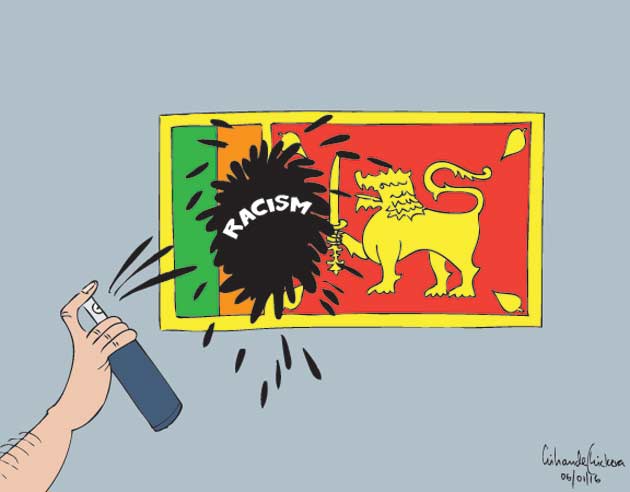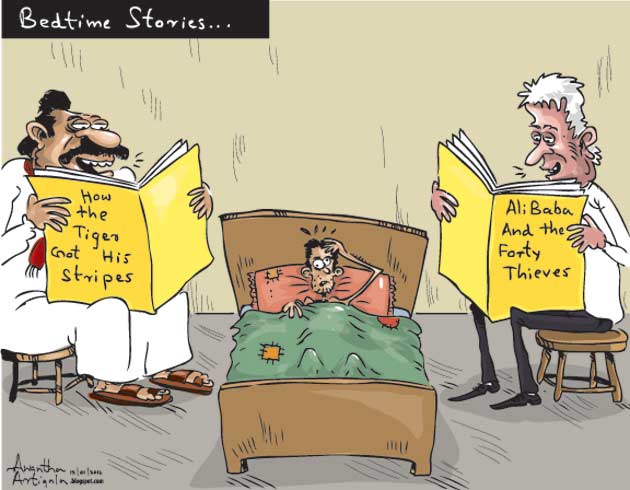Sri Lanka has seen significant political drama over the past 12 months. Mahinda Rajapaksa, the previous president who ruled for a decade was unexpectedlydefeated during last January’s presidential election. Voters reiterated their desire for change during August parliamentary polls, though Rajapaksa still won a seat in parliament. Current President Maithripala Sirisena, a former member of Rajapaksa’s cabinet, promised bold reforms and has taken a few steps in the right direction.
However, across the diverse panoply of possible reforms, we’re seeing more than a modicum of incoherence and a lack of transparency. Amongst those stalled reforms, anti-corruption efforts stand out. We’re still not witnessing accountability for corruption, a fundamental reason why Rajapaksa was thrown out of power.

Daily Mirror, Colombo, January 6, 2016
Largely due to sustained international pressure, Sirisena’s coalition government has now made serious commitments regarding reconciliation and transitional justice, although the government’s actions thus far are incompatible with those pledges. For example, if the Sirisena administration is really serious about transitional justice, Colombo must finally explain the substance of the most recent U.N. Human Rights Council resolutionon Sri Lanka to the general public. That resolution deals broadly with transitional justice, human rights and governance; incredibly, the Sri Lankan government even co-sponsored it. Additionally, instead of pretending that international involvement in Sri Lanka’s proposed transitional justice plan is superfluous, Colombo needs to explicate the importance of international involvement to ensure that the entire process is comprehensive, inclusive and credible.
In order to better understand the challenges for the new government’s extensive reform agenda, now is an auspicious time to revisit the circumstances surrounding this year’s elections. While some may remain hopeful that Sirisena will bring a divided, post-war nation together, it’s helpful to keep in mind that the dominant narratives surrounding both votes this year addressed neither national reconciliation nor minority grievances. Kumaravadivel Guruparan, a lecturer in law and spokesperson for the Tamil Civil Society Forum, says that Rajapaksa “was defeated because of his corrupt, family nepotism” and believes “there was no mandate for reconciliation.” This take makes sense because contesting either election on a reconciliation platform would have been political suicide, as such a message would not have resonated with most ethnic Sinhalese. “Rajapaksa was not defeated because of his policies against Tamils,” notes Guruparan.
Sri Lanka’s minority groups voted overwhelmingly for Sirisena, yet Colombo has been reluctant to reach out to Tamils. It’s hard to believe that a meaningful transitional justice process is feasible if the government refuses to release Tamil political prisoners. And, thus far, the government has been unwilling to acknowledge that sustained militarization across the historically Tamil Northern and Eastern provinces contradicts any substantive transitional justice agenda. While the government has released some land (which had been occupied by the military) to Tamil civilians, much work remains to be done in this area too. Furthermore, recent research has proven that the ongoing abduction, torture and rape of Tamil civilians continues under Sirisena’s watch. That said, one could argue that the situation would be even worse if Rajapaksa were still running the show. “There is nothing more the Tamils dread than a change back to a Rajapaksa led government,” says Jehan Perera, executive director of the Colombo-based National Peace Council.

Daily Mirror, Colombo, January 12, 2016
On the bright side, there’s now greater tolerance for public dissent and a constitutional amendment to trim presidential power has been passed. “The most positive accomplishment of the government has been the sense of freedom it has brought to the people at large,” notes Perera. Attacks against religious minorities have dropped as well. Sirisena has also done a better job of managing the country’s foreign policy. That being said, Sirisena’s been in office for over 12 months and the government’s parade of promises seems to know no bounds. The government has now promised a new constitution that will finally abolish the powerful executive presidency and create a lasting political solution to the longstanding ethnic conflict.
To conclude, the democratic gains that Sri Lanka has made over the past 12 months are real and deserve to be recognized, but so do the outstanding concerns about the reform agenda and the array of challenges that lie ahead. The current situation in the country is messier and more complicated than it may at first appear. A deepening of democracy in the coming months isn’t a forgone conclusion; neither is the implementation of a comprehensive transitional justice package. Moreover, the progress thus far has been asymmetrical; there’s a lot about daily life in the country’s Tamil-dominated areas that hasn’t changed since Rajapaksa’s ouster.
Sirisena’s ascension to the presidency really shook up the country’s political scene. He has the chance to do so again: by leading the way on constitutional reform; by overseeing the implementation of a comprehensive approach to transitional justice; by standing up to the military and emphasizing that a culture of impunity will no longer be tolerated; by explaining to Sinhalese why the need for accountability and a durable political solution are so important; by proving to the Sri Lankan people and the world that he’s a real democrat.